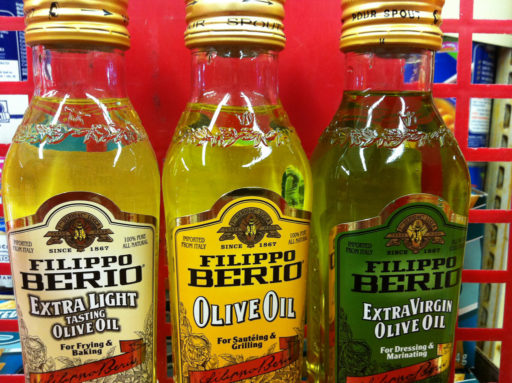
When companies deceive consumers, the class action device provides a way to compensate those harmed. And if plaintiffs’ lawyers obtain money for the class, they are lawfully entitled to a reasonable percentage of the recovery. But in too many settlements, the same lawyers who rail against deceptive marketing tactics use deceptive settlement provisions to unfairly appropriate the lion’s share of the money for themselves.
Kumar v. Salov North America Corp., where the attorneys look to get over 300% of what their clients will, is a good example of this unwelcome phenomenon. The defendants market Filippo Berio olive oil throughout the United States. (Salov is an acronym for Societa per Azoni Lucchese Olii e Vini [Society for Oils and Wines of the Province of Lucca], a company founded by the real Filippo Berio’s daughter. We learned that for this blog post. Just last week, we thought Filippo Berio was like Aunt Jemima or Chef Boyardee. Though there apparently really was an Ettore Boiardi. So that’s two things we learned writing this blog post.)
Until 2015, the phrase “Imported from Italy” appeared in the corner of Filippo Berio labels. The plaintiff argued this was deceptive, because many olives used to make Filippo Berio came from places other than Italy: Greece, Tunisia, and elsewhere, even if the phrase was accurate because the ultimate product was bottled in Italy. Indeed, the lead plaintiff, Rohini Kumar, testified in a deposition that she thinks “imported from” means “shipped out of.” (Salov, the maker, argued that the back of the bottle had a disclaimer about the origin of the olives to boot, right next to the “sell-by date” that Kumar testified she always looked at.)
So you can see that the lawsuit was going to run into trouble if it went to a jury trial. (We haven’t even mentioned that Salov was hoping to get to impeach Kumar as a convicted felon, but maybe the evidence of the drunk-driving conviction gets excluded.) This likely explains why the settlement is a weak settlement—but it doesn’t justify a settlement where the attorneys get more than the class.
Whether or not this “Imported from Italy” puffery truly misled consumers, the settlement the parties reached is puffed up beyond belief. The class will probably recover about $320,000 in cash; roughly 65,000 class members jumped through the hoops to file claims worth about $5 each. But class counsel is asking for $987,500 in fees, triple what the class will actually receive. How did class counsel justify such a disproportionate fee?
Here’s how: embedded deep in the settlement agreement is a “kill-switch” provision that allows the defendants to cancel the entire settlement if their total payout of claims, fees, and administrative costs exceeds $5,000,000. Based on this provision, the parties argue that the defendants “made available” $5,000,000 to the class. The problem? This number bears no resemblance to reality, because the settlement throttles the number of claims. Anyone who purchased Filippo Berio is a class member; but only those class members who are willing to attest, under oath, that they relied on the tiny “Imported from Italy” wording can file claims. The parties admitted, in their own briefing, that this requirement meant there was almost no way the $5,000,000 figure could be reached without massive fraud. In their words, the kill-switch provision was an “escape valve,” not a good-faith estimate of class recovery.
The settlement also includes an injunction, as so many puffed up settlements do, prohibiting the use of the “Imported from Italy” wording on Filippo Berio bottles for three years. This is yet more illusory relief. The defendants removed the “Imported from Italy” wording from their label two years ago; precluding the defendants from doing something they had already stopped doing is not compensation for any alleged past injury. Moreover, the price of Filippo Berio has stayed the same since the label changed, suggesting that the “Imported from Italy” representation never really had any effect on the price of the product. Class counsel proffered an expert who, by studiously ignoring the evidence of prices after the label change and engaging in questionable data coding, argued this would save the class $19 million. Such quackery is a typical tactic in creating an illusion of relief, and shouldn’t justify attorneys’ fees.
Class action settlements should be less misleading than the practices targeted by the underlying lawsuits. But here, lawyers have used deceptive provisions to manufacture $24 million in settlement value out of thin air. In reality, this is a $1.3 million dollar settlement, and the lawyers are claiming almost 75% of the fund. Lawyers who are granted the privilege of litigating on behalf of a class should not appropriate the lion’s share of the money for themselves. CEI is objecting to the settlement and the fee request, with CEI attorney Ted Frank, a class-member and long-time Filippo Berio consumer, as the client. (His grandmother’s spaghetti-sauce recipe has not yet been subpoenaed.) We’ve previously won objections in Pearson v. NBTY, Dry Max Pampers, Baby Products, and Allen v. Similasan against similarly abusive settlements on these principles, resulting in millions more dollars going to consumers instead of lawyers.
The fairness hearing is May 30 in Oakland. The case is Kumar v. Salov North America Corp., No. 4:14-cv-02411-YGR (N.D. Cal.).
